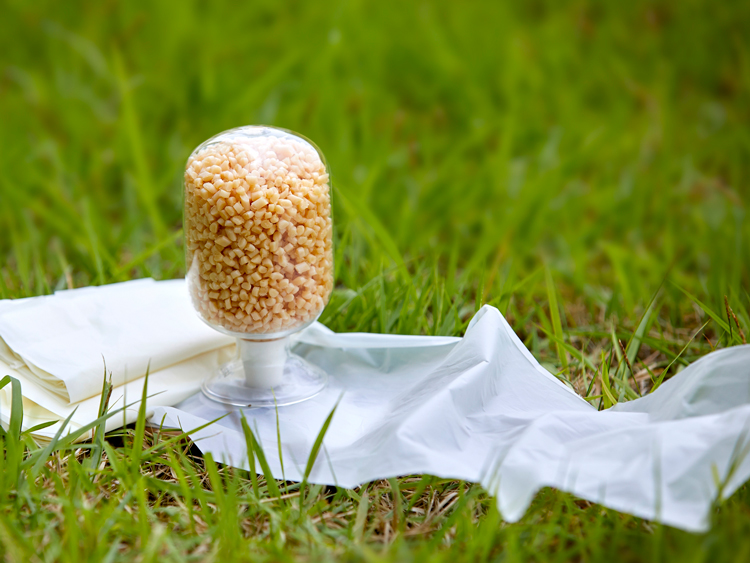Samyang Corporation commercializes biodegradable plastic PBIAT
2021.10.12- Commenced mass production of biodegradable plastic PBIAT, which is based on biomass “isosorbide”
- Carbon-neutral and tougher than petroleum-based PBAT, showing faster biodegradation as well
- Will promote the expansion of application to disposable straws and adhesives for tape in addition to film-type use

▲Isosorbide-based biodegradable PBIAT commercialized by Samyang for the second time in the world and plastic film made using PBIA
Samyang Corporation is accelerating the eco-friendly plastic business by commencing the mass production of a biodegradable plastic material
it developed independently using “isosorbide.” Isosorbide is a biomaterial produced through chemical processing of starch extracted from
plants such as corn. As a substitute for preexisting chemical materials, isosorbide is used to produce plastics, paints, and adhesives.
Samyang Corporation (CEO: Kang Ho-sung) announced on the 7th that it had started mass-producing PBIAT, a biodegradable plastic material,
at Jeonju Plant. Samyang’s PBIAT is used to produce disposable plastic bags. The company plans to expand the application of this material
to agricultural plastic mulch films (film used for covering soil to control weeds and moisture).
PBIAT (polybutylene isosorbide adipate-co-terephthalate) is an eco-friendly plastic created by remedying the shortcomings of PBAT,
which is a petroleum-based biodegradable plastic, through the use of isosorbide. Containing isosorbide, a biomaterial,
PBIAT is carbon-neutral, naturally degrading in soil faster than PBAT. It is also tougher than PBAT. As thinner and tougher products
can be made using a smaller amount of PBIAT than PBAT, PBIAT also reduces the amount of plastics used.
Samyang’s strategy is to replace not only PBAT but also general biodegradable plastics with PBIAT, a material with superior properties and
outstanding eco-friendliness. To implement this strategy, Samyang is reviewing market expansion from the existing film-type use to
disposable biodegradable straws and adhesives for tape.
Compared to PBAT, Samyang’s PBIAT is more flexible and is consequently helpful in improving straw quality. It can also reduce the defect rate
in the manufacturing process. For adhesive tapes, which are mainly used for parcel packing, paper-type products have been released in line
with the recent trend of eco-friendliness. However, the adhesives applied to the inner surface of the tape are made of chemical materials.
The adhesives made with PBIAT are expected to contribute to lowering carbon emissions compared to conventional products made using chemical materials.
In addition, PBIAT enables Samyang’s entry into the EU market as it meets the EU’s regulatory conditions for biodegradable plastics.
In Europe, only materials with biomass content of at least 50% can be used for disposable plastic envelopes. Samyang currently has the
capacity to produce PBIAT with up to 50% biomass. It is continuously studying technologies to increase the biomass content.
“We will continuously promote the development of highly functional eco-friendly materials without the shortcomings of the existing
biodegradable plastic products by using isosorbide, a biomass material, and applying our organic synthesis and polymerization technologies.
We will develop plastic materials that are degradable not only in soil but also in the sea for new purposes, such as to produce fishing nets,”
a Samyang official said.
In 2014, Samyang secured the commercial isosorbide production technology for the second time in the world.
The company is building an isosorbide factory with an annual production capacity of approximately 10,000 tons
at the Samyang Innochem Corporation Plant. With the factory’s construction soon to be completed,
Samyang is developing a variety of applicable technologies and products and is preparing for commercialization.
In April 2020, Samyang was selected as the leader of the Biomass-Based Biodegradable Polycarbonate (PC) and Parts Development Project
supervised by the Ministry of Trade, Industry and Energy. They are currently working on developing isosorbide-based biodegradable polycarbonates
and commercializing automobile components using this material.
